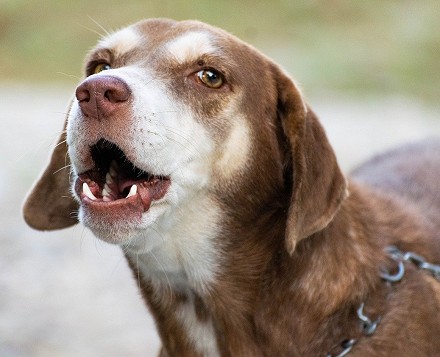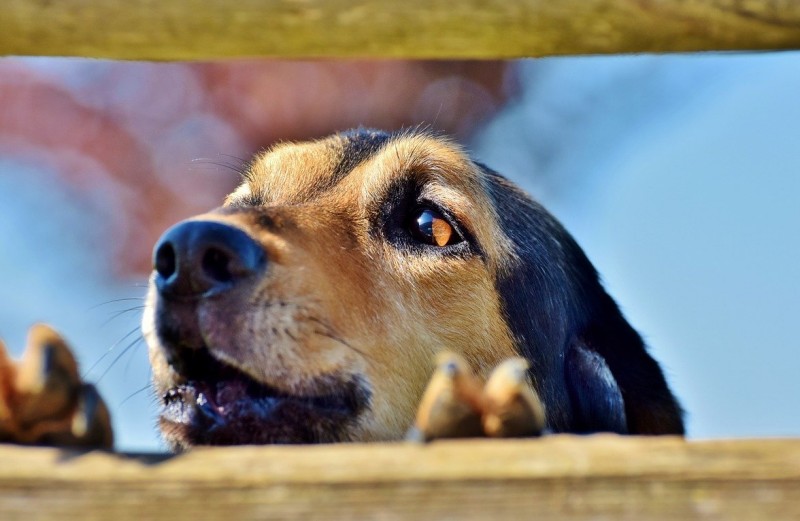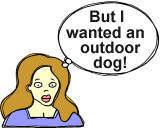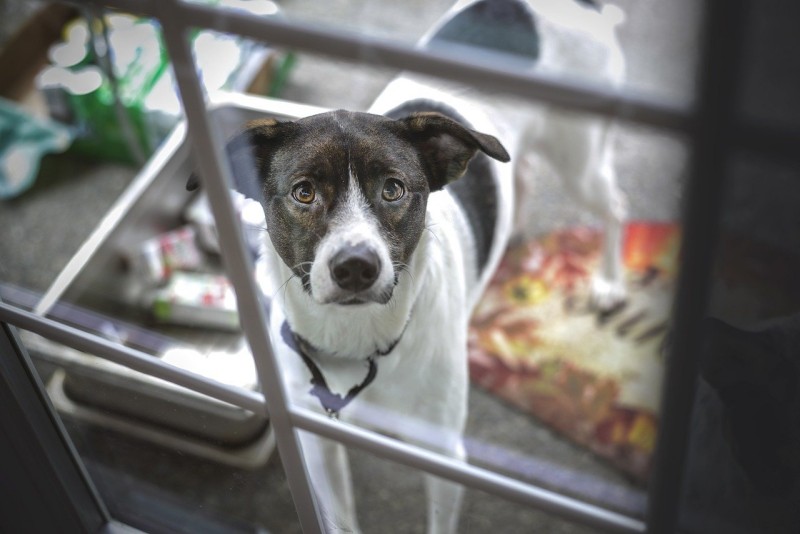Stop your dog from indiscriminate barking
By Michele Welton, Dog Trainer, Breed Selection Consultant, Author of 15 Dog Books
Most dogs will bark when they hear a strange sound or see something out of the ordinary. This is fine, as you don't want to stop your dog from being a good watchdog.
But most dogs bark far too much, making them useless as watchdogs. They're like The Boy Who Cried Wolf – no one even looks to see what they're barking at anymore. Frequent barking also keeps a dog in a heightened state of excitability instead of calmness.

This Puggle's heart is in the right place when he barks – he thinks he's sounding the alarm righteously. Unfortunately most dogs have not been taught when they should and shouldn't be barking.
Be honest – is your pup....
- barking at the neighbors?
- barking at the neighbor's dog?
- barking at passersby on the sidewalk?
- barking at kids on bicycles?
- barking at the mailman?
- barking at the garbage truck and UPS truck?
- barking when other neighborhood dogs bark?
Our dogs must be taught to recognize familiar things that are harmless. The way they learn to do this is by US telling them what's harmless.
Teach your pup that some situations should never be barked at, while other situations can be barked at in a limited way
For example, your pup looks out the window and sees an ax murderer on the sidewalk. He starts barking. You look out and see.... the sweet old lady from Apartment 2A shuffling along with her walker.
She's harmless. You don't want your pup barking at that lady. So stop it with No, plus a correction. The message is: "Don't bark at that person. At all."
You're telling your dog that you, as the leader, have already evaluated that person and found her harmless. That's what leaders do and a respectful dog will accept your judgment.

He can give a warning, but then must turn the situation over to the leader: YOU.
Now suppose a delivery man is standing on your porch. It's perfectly fine for your pup to bark – a few times.
"Good boy, Jake." Then use the phrase you learned here: "That's enough" or "All done" or "No more." I usually add "Stop" or "Quiet" because they're such natural words that come right to mind.
Wait 2 seconds and if he hasn't stopped, use one of the corrective techniques in my article on teaching No.
You want your pup to learn that yes, barking at someone on the porch is okay, but when you say stop, it needs to stop. He must accept that YOU will take over and handle the situation. That's the responsibility of the leader.
Barking when the doorbell rings
...or when someone knocks at the door. See this article.
Barking when you're not home
This is bad for the neighbors and bad for the dog's state of mind. Many owners aren't even aware of how much their pup barks when they're not home. It's a good idea to leave the house sometimes and lurk outside for 10 or 15 minutes, listening.
Here are some tips for stopping this problem:
- Block his view of the outdoors. Leave him in a room with no view outside, or else install shades or drapes to block his view.
- Block sounds from outdoors. Put on soothing music – classical, soft jazz, elevator music, or nature sounds. Or tune the TV to the Golf Channel. No hard rock or rap music, loud excitable sitcoms, or argumentative political discussions. You're trying to promote calmness.
- Provide more exercise and interesting activities. Tired pups are more likely to sleep. People often think their dog gets plenty of exercise wandering around the yard. Unless your dog is tiny, that's seldom true. When a dog doesn't have anything interesting to do, he will feel bored and frustrated, and pups express boredom and frustration by destroying things or barking.
- Discourage clingy, dependant behaviors. Your pup needs to learn to stand on his own four feet without you frequently holding him or cuddling with him.

- Stage corrective set-ups. This means leaving the house, lurking close by until you hear barking, then coming back inside (perhaps sneaking in a back door) to correct him. Alternatively, you can leave while your spouse remains hidden inside, listening and prepared to emerge and correct.
- MAYBE get your dog a companion... but not yet! If your dog absolutely must be alone for more than four hours a day, consider getting a second dog to keep him company. But not yet! Don't try to raise two new dogs at the same time. They will tend to bond with each other and follow each other rather than you. Then you'll have two barkers.
Instead, work with the pup you have, and when he is well-behaved, respectful, and 100% housebroken, then look for another dog to keep the first one company during those long lonely hours. I recommend adopting an adult dog of the opposite sex. Definitely not a puppy if you're gone all day!
How to leave your dog home alone
How you leave the house can make a big difference in how your pup acts when you're gone. For example, don't do this....
 "Jake sweetie, Mummy and Daddy have to go out for awhile, okay? We're sorry to leave you all by yourself. But we have to, Jake. Don't be mad and don't be scared. We'll come back. It will be all right, don't worry, we'll be home soon!"
"Jake sweetie, Mummy and Daddy have to go out for awhile, okay? We're sorry to leave you all by yourself. But we have to, Jake. Don't be mad and don't be scared. We'll come back. It will be all right, don't worry, we'll be home soon!"
Ugh! When you need to leave your dog alone, don't make a big emotional scene. A melodramatic exit revs up your pup's nervous system and creates anxiety, which he will probably try to relieve through chewing, digging, or barking.
 Instead:
Instead:
- Provide an activity/play session before you leave.
- Just before you leave, take him outside one last time to relieve himself.
- Turn on soothing music or a relaxing TV station like the Golf Channel. Put him in his crate or pen or gated room. Give him a Kong® toy to chew on.
- Sit for a few minutes, reading the paper or watching TV. Then say calmly, "Bye, Jake. Be a good boy." No fondling, emotional farewells, or lingering looks. Just leave.
How to come home to your dog
Similarly, when you come home, don't burst in the door and overwhelm your pup with hugs and kisses.
After quiet hours alone, a melodramatic entrance is too stimulating for your dog's nervous system. He will begin to anticipate your homecoming long before you arrive, and as he awaits the big emotional scene, he will become more and more anxious and revved up.
Instead:
- Come in. Say, "Hi, Jake." Then ignore him. Hang up your jacket. Don't pay any attention to your pup. Don't even look at him. A few welcoming barks are fine, but if he makes a racket, correct it.
- Soon he should be calmer and more settled. If he is in a crate or pen, open the crate door. Remember to have him "Wait" inside the crate until you say "Okay." Cue him, "Do you need to go OUT?" and take him directly outside to the bathroom. After he's taken care of business, that's when and where your homecoming reunion should take place!
If your pup is barking outdoors
A dog should not be outside by himself. Someone should be out with him to make sure he doesn't eat something he shouldn't, or find a way to escape, or dig holes in your flower bed, or bark.

When you're outside with him, you can both monitor his safety and correct unwanted behaviors, including barking.
If you already know your dog displays some behavioral problems outside, be prepared to deal with any problems by keeping him on a long line (15 to 30 feet long). Either hold it in your hand, or let him drag it so you can easily get hold of him if he starts barking at a neighbor.
This is one of the great benefits of teaching "No" – you can stop almost ANY unwanted behavior so easily!
 Were you hoping your dog could stay outdoors by himself during the day? While you went off to work and the kids to school?
Were you hoping your dog could stay outdoors by himself during the day? While you went off to work and the kids to school?
Bad idea. Even a dedicated dog lover like myself becomes frustrated and angry when an owner puts a dog outside and trots off to work, leaving the rest of us listening to barking. In fact, I'm the first one on the phone to the homeowners association, animal control, or the police.
Neighbors who are not dedicated dog lovers may resort to a BB gun, rat poison, transporting your pup to a distant city, or opening your gate so your nuisance dog "escapes."
In addition, the vast majority of outdoor dogs are not happy.
Sure, if you live on a 20-acre farm and your livestock guardian dog is guarding your sheep.... or if you live in Alaska and your sled dogs are pulling sleds.... or if you live out in the rural countryside and take your pack of hounds hunting every weekend....
.....those dogs are fine with living outdoors because they're regularly performing the work they are genetically hardwired to do.

But if you want a dog as a family companion, only an indoor dog can fulfill this role. Remember, dogs are sociable creatures who want to live among their family.
Your pup wants to be in the same room with you and your family, listening to your conversations and lying on the rug near you as you watch TV or work/play on the computer.
Dogs who spend hours and hours outdoors are forced to live "outside" their pack, on the fringes of it, not immersed in day-to-day family life.
So please, bring your dog indoors and start teaching calmness, housebreaking, and so on. Your dog will be a fine indoor companion if you follow my training program faithfully. Your neighbors will appreciate it, too.
My best-selling books – now available FREE on my website
 Respect Training For Puppies: 30 seconds to a calm, polite, well-behaved puppy is for puppies 2 to 18 months old. Your puppy will learn the 21 skills that all family dogs need to know. Click here to read for free.
Respect Training For Puppies: 30 seconds to a calm, polite, well-behaved puppy is for puppies 2 to 18 months old. Your puppy will learn the 21 skills that all family dogs need to know. Click here to read for free. Teach Your Dog 100 English Words is a unique Vocabulary and Respect Training Program that will teach your adult dog to listen to you and do what you say. Click here to read for free.
Teach Your Dog 100 English Words is a unique Vocabulary and Respect Training Program that will teach your adult dog to listen to you and do what you say. Click here to read for free. 11 Things You Must Do Right To Keep Your Dog Healthy and Happy helps your dog live a longer, healthier life. Get my honest advice about all 11 Things before you bring home your new puppy, because some mistakes with early health care cannot be undone. Click here to read for free.
11 Things You Must Do Right To Keep Your Dog Healthy and Happy helps your dog live a longer, healthier life. Get my honest advice about all 11 Things before you bring home your new puppy, because some mistakes with early health care cannot be undone. Click here to read for free.
